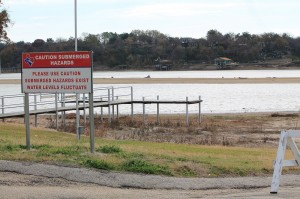The Brazos River Alliance is a new player in the Texas water wars. The alliance, a coalition of the Friends of the Brazos, Save Lake Granbury, and the Possum Kingdom Lake Association, has joined with 34 other parties to fight the Brazos River Authority’s application for additional water rights.

“Undoubtedly, the drought, coupled with the water management practices of the Authority, are of dire concern here in Granbury and beyond,” said Ken Hackett, leader of the alliance.
Alliance members believe that allowing the river authority to sell much larger amounts of water than they already take from the Brazos will seriously harm the economies and environments of communities located near Possum Kingdom and Granbury. Currently, Possum Kingdom Lake is less than two-thirds full, and Lake Granbury is at a record low, nine feet below what used to be its nearly constant level.
Squaw Creek Reservoir is at full capacity, and for good reason. Its water, supplemented from Lake Granbury, is used to cool the Comanche Peak nuclear plant. When water is released from the plant back into the reservoir, it is so hot that the Lake Granbury water is needed to help cool it down. Water from the Squaw Creek Reservoir eventually returns to the Brazos downstream from Granbury.
Beyond the drought factor, Hackett believes that Lake Granbury’s low-water conditions are caused by increased water usage by Comanche Peak and by the river authority’s decision in 2007 to shut down the hydroelectric plant on the dam at Possum Kingdom.
The river authority had a contract with the Brazos Electric Power Cooperative to sell electricity produced by the dam’s operation. But producing that power required a certain level of discharge from Possum Kingdom to run through the plant’s generators. When the river authority canceled the contract, one factor in favor of sending more water downstream to Granbury was removed.
The river authority shut down the hydroelectric plant because its contract with the utility required it to sell power at 1992 rates, despite rising costs of operations and the need to make major repairs and upgrades to the 75-year-old plant.
“We ended up having to write off millions of dollars in losses at that location,” explained Phillips. “Those are losses our water customers were having to pay.”
Brad Watson, senior director of corporate communications for Luminant, which owns the Comanche Peak plant, said several factors determine how much water is used from Lake Granbury: evaporation and rainfall at Squaw Creek, how hot the weather is, and how often one or both of the units at the plant are shut down for refueling and maintenance. The plant needs more Lake Granbury water in the summer months, when the temperature of water in the reservoir can sometimes reach 95 degrees, even at night.
“The water can’t get too hot, or they have to power down from 100 percent power to whatever it is to maintain a certain temperature level [in the reservoir],” said Laura Uselding of the Nuclear Regulatory Commission.
Eventually, the nuclear plant will have to install chillers, which would lessen its demand on Lake Granbury, said Hackett, who claims the river authority didn’t take that into consideration when filing its application for increased water rights.
It’s just another example of the river authority’s miscalculations of the amount of water it needs, he said.
“The [state] water code says you’re supposed to present the public benefit and then request the amount of water for that benefit,” Hackett said. “What they [Brazos River Authority] want is kind of a blank check. You lease us the extra 400,000 acre-feet of water, and we’ll tell you who’s going to get it later.”
He also believes that the agency needs to update key studies of the river, one of them 20 years old, that were used in the permit application, especially because the studies don’t take into consideration the current deep drought.
********
Back in Granbury, for-sale signs dot the lawns of lakeside neighborhoods, but houses aren’t selling like they did a few years ago. The economy, fueled in part by lake-loving tourists and part-time residents, is hurting, said Hackett, a real estate agent in Granbury.
The river authority does acknowledge the financial effect of low lake levels on lakeside economies, but Phillips said Granbury residents need to recognize the broader realities of what would happen to communities, farmers, and industries all along the Brazos if the authority could no longer provide adequate drinking water.
“At the end of the day, we’re all praying for rain,” said Phillips. “I know that sounds like something some of us probably don’t want to hear. We would like to see the lakes fill up, too. It helps us in terms of managing the basin. We have to wait until the drought breaks.
“It will rain again, and the lakes will fill up. It’s possible. We just need rain.”
North Texas freelance writer Christian McPhate can be reached at christianmcphate@gmail.com.











